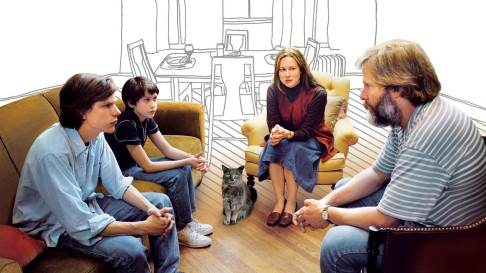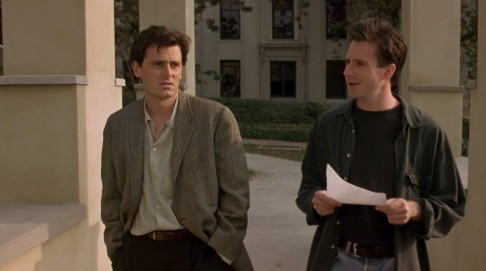
Noah Baumbach's While We're Young deals with resisting maturity
American director's latest work takes two couples whose friendship reveals the gaps between self-image and reality
Twin themes - the struggle to grow up and the reluctance to do so - lie at the heart of Noah Baumbach's work. It's a conflict that first manifested itself in 1995, with the then-26-year old filmmaker's debut, , a smarty-pants look at a group of post-college pals who can't seem to get out of first gear.
Baumbach describes his artistic vision as a kind of hindsight. "I remember talking to a friend of mine, and we were referring to a past experience we both had. He said suddenly: 'Well, I was so depressed then.' I remember thinking: 'You never talked about it then.' It was something that he was only just coming to terms with." All of his work, the filmmaker says, is an effort to dramatise the "drip-drip" nature of experience, in which breakthroughs come slowly and are often late, if they arrive at all.
Never has the elusive nature of maturity seemed quite so slippery as in . Considering that its stars (Ben Stiller, 49, and Naomi Watts, 46) are no spring chickens, the film's very title offers a sardonic commentary on time and those who choose to march to the beat of a different drum.
The film centres on New Yorkers Josh and Cornelia, a married couple in their 40s who are in denial about encroaching middle age. When they meet Jamie and Darby, millennial hipsters played by Adam Driver and Amanda Seyfried, the inter-generational friendship briefly rejuvenates the older protagonists.
Baumbach's dialogue is typically wry. "I remember when this song was just considered bad," Josh tells Jamie, who's listening to on giant headphones and wearing a "kiss the chef" apron while barbecuing on a Brooklyn sidewalk.
Baumbach sat down for a wide-ranging chat that meandered from the philosophy of French director Jean Renoir's (1939) to the emotional truth of the sitcom . ("Sam isn't that stupid," Baumbach recalls his father, the writer and film critic Jonathan Baumbach, telling him.)

Sporting a mop of shaggy, jet-black hair, Baumbach doesn't look that different, if you squint, from the enfant terrible who burst onto the indie-movie scene 20 years ago. Pairing purple New Balance sneakers with a bulky sports jacket, he exudes the mature yet laid-back air of a cool college professor with some sort of Dorian Gray thing going on.

How is it possible that Baumbach, 45, is a grown man, when he still looks like the whiz-kid from ?
Baumbach, for his part, sees his overarching theme as something other than growing up. Rather, he says, his movies are "all about the psychology of relationships over time. All my movies deal with that to some degree: this notion of maintaining relationships through periods of change."
According to Baumbach, stemmed from his desire to make a comedy about marriage, or more specifically, a "comedy of remarriage". Popular in the '30s and '40s, the genre, a subset of screwball comedy, involves marriages on the rocks.

Baumbach has turned to his own life for material before. He and actress Jennifer Jason Leigh, were married for five years before she filed for divorce in 2010. They have one son, named Rohmer, after the French director Eric Rohmer. Now the filmmaker is dating actress Greta Gerwig, 32, who starred in Baumbach's (2010) and (2012) and has collaborated with him on several scripts, including and the latest, .
Part of therapy is being able to acknowledge the darker aspects of yourself and of the people around you
Baumbach calls less autobiographical than generically personal. "There's nothing strictly true about this movie," he says, describing his approach to storytelling as growing out of what he calls life's universal questions: "How can you be the best version of yourself and maintain your responsibility to your own self and to your own growth, and how does that affect the people around you? Are you going on this thing together, or are you going to end up having to go in different directions?"
The mistakes Baumbach's characters make render them, at times, unlovable. , for example, was a tough sell, as its focus was on an abrasive curmudgeon - it was Stiller's first film with Baumbach - who alienates almost everyone, except the character played by Gerwig. Nicole Kidman's haughty and competitive star turn in (2007) was, for many viewers, even more off-putting.

Yet despite such difficult protagonists, Baumbach's films have a generosity of spirit. In , for example, it would be all too easy to satirise - or worse, dismiss - Driver's and Seyfried's hipsters. But it's clear that Baumbach loves those characters, in a way, as much as Josh and Cornelia initially do.
Baumbach explains his curiosity by quoting the famous line from Renoir's : "Everyone has his reasons."
Such acceptance of our shared imperfection, he says, comes not from upbringing or temperament, but from years of therapy. (Though Baumbach briefly saw a psychiatrist as a teenager, he didn't begin actual psychotherapy until his late 20s, after the release of , a 1997 flop that ushered in eight years of "struggle" before his next movie, , an Oscar-nominated hit loosely based on his parents' divorce.)
"Part of therapy is being able to acknowledge the darker aspects of yourself and of the people around you, to understand yourself," he says.

"Anybody who's had any
therapy kind of discovers fairly quickly that there's a gap between your real self and the self you present to the world, no matter how self-actualised you are. That's what the basis of all this is."
In , Driver and Stiller play documentary filmmakers. The younger man exhibits questionable ethics that inflame Josh's old-fashioned sense of truth in art - but also make him feel like a dinosaur. It's tempting to read the characters as versions of Baumbach - Josh as close to the filmmaker's real self, and Jamie a kind of youthful wish fulfilment).
For Baumbach, the characters of Jamie and Darby - though grounded, as are all of Baumbach's characters - are not as fleshed out as Josh and Cornelia.

"What was fun for me about this story was thinking, in a way, of Jamie and Darby as almost like projections," he says. "They could be ghosts in another story."
In other words, they're catalysts - leading to Josh's ultimate epiphany about life, which comes late in the film. "You always go into therapy for one thing," Baumbach says, "and then you realise you've got a whole other thing."
That might make sound like medicine, but it's not. Baumbach wants audiences to remember that not only is the movie very much a comedy, but also that he - as its director - is still young at heart.
"I mean, come on," he says, "the movie has a montage of people throwing up in it."
The Washington Post
opens on August 20
